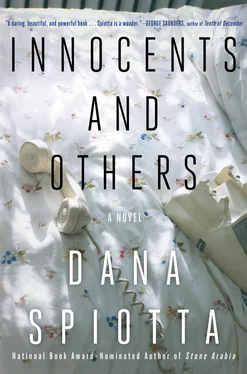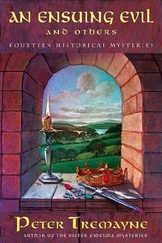Dana Spiotta - Innocents and Others
Здесь есть возможность читать онлайн «Dana Spiotta - Innocents and Others» весь текст электронной книги совершенно бесплатно (целиком полную версию без сокращений). В некоторых случаях можно слушать аудио, скачать через торрент в формате fb2 и присутствует краткое содержание. Год выпуска: 2016, Издательство: Scribner, Жанр: Современная проза, на английском языке. Описание произведения, (предисловие) а так же отзывы посетителей доступны на портале библиотеки ЛибКат.
- Название:Innocents and Others
- Автор:
- Издательство:Scribner
- Жанр:
- Год:2016
- ISBN:нет данных
- Рейтинг книги:5 / 5. Голосов: 1
-
Избранное:Добавить в избранное
- Отзывы:
-
Ваша оценка:
- 100
- 1
- 2
- 3
- 4
- 5
Innocents and Others: краткое содержание, описание и аннотация
Предлагаем к чтению аннотацию, описание, краткое содержание или предисловие (зависит от того, что написал сам автор книги «Innocents and Others»). Если вы не нашли необходимую информацию о книге — напишите в комментариях, мы постараемся отыскать её.
Innocents and Others — читать онлайн бесплатно полную книгу (весь текст) целиком
Ниже представлен текст книги, разбитый по страницам. Система сохранения места последней прочитанной страницы, позволяет с удобством читать онлайн бесплатно книгу «Innocents and Others», без необходимости каждый раз заново искать на чём Вы остановились. Поставьте закладку, и сможете в любой момент перейти на страницу, на которой закончили чтение.
Интервал:
Закладка:
One thing my mother’s teaching afforded us was free tuition at Wake School in Santa Monica — which is an arts-focused private high school. In those days it was a no-frills enterprise, simply an alley with prefab box classrooms on each side. But it had — and still has — extraordinary teachers. Attending Wake helped make me a filmmaker in a number of ways. [ Editor’s note: Carrie Wexler has endowed fellowships for young women of limited means at a number of elite high schools across the country. ] I had the great fortune to take a class from Jay Hosney, the (now-retired) legendary English and communications teacher. He never patronized us, and he taught challenging and important films. He showed us great silent films like Sunrise by Murnau and Joan of Arc by Dreyer. He showed us iconic American films of the ’40s and ’50s, not just film noir and Westerns, but the perverse women’s films of Douglas Sirk, which I loved because they seemed to both celebrate and subvert — in vibrant Technicolor — the consumer culture I recognized. He also had us watch European films like Persona, Bicycle Thieves, 8½, Jules and Jim. Of course we saw Breathless , but also Godard’s Week End , and let me tell you how much the world opens up to you when you “get” a cinematic joke that Godard has told. There is a moment in Week End in which the girl, Mireille Darc, stops at a car wreck and pulls designer jeans off a dead body. Laughing at this — as a young girl in Southern California — changed me. We were not Godard’s famous “children of Marx and Coca-Cola,” we were more like the children of TV and Tab, but in some of us grew a profound hunger for a funny and provocative joke, a want from the depths of our processed American childhoods. Finding humor in Godard worked for me like reading Mad magazine or watching the conceptual jokes of Monty Python , or collecting the satirized ads of Wacky Packages: a cynical, knowing joke was an inoculation against all the crap we still consumed, what we swam through every day. We reminded ourselves that it was bad and we knew it was bad, even as we were saturated in it. We forged a kind of default irony as a way of making meaning and authenticity. This sensibility is a hallmark of people of my generation, and Jay Hosney’s film classes gave me a way of looking at it all, an approach. Culture, then, became mine for the taking. I cannot explain what a gift it was to learn that at a young age. You waste no time feeling intimidated. You are in the know in a most empowering way. That is why comedies are so important to me: they are both in the culture and pointing at the culture. Mainstream and subversive, at least ideally. So school made a huge difference to me. But the other leg of my apprenticeship came from a friendship. My closest (if not best) friend in those years and for many years into my adulthood was Meadow Mori.
I met Meadow at Wake School when we were both in eighth grade. When I saw her the first time, I thought she was older than I was: she wore stovepipe tight black jeans, black motorcycle boots, and a ribbed black turtleneck. She was slim and flat-chested, her brown hair cut in an asymmetrical bob, and she wore no makeup except dark red lipstick. She had a large, straight nose that gave her a defiant, anti-pretty edge. The look was a kind of ’60s beatnik variation of punk, which was a tremendous amount of glamour for a thirteen-year-old. At the time I was still feathering my blond hair and wearing badly applied blue eyeliner. I bought too-tight jeans at Fred Segal and had them altered to cut close at my ankles (we all did), but I was too chubby to look good in them and I wore oversized men’s shirts to cover the bulge at my waist. Which probably made me look even fatter. I was uncomfortable and awkward in my body, and what impressed me most about Meadow was how confidently she inhabited herself. She glided into a room and every eye turned to her and she seemed unfazed by the attention. She fascinated me; I had one of those adolescent girl crushes on her, half admiration and half envy. I would have admired her from afar for years, but I had the dumb luck to be assigned a seat next to her in Jay Hosney’s ninth-grade honors English class. That first day, I was thrilled to see her up close in all her detail. She had ditched the black and now wore a white sleeveless shell shirt and white tailored capri pants tucked into flat-heeled ankle boots. She had applied a perfect cat eye with liquid eyeliner, and her lipstick was very pale. A sleek sex kitten, but modified by her muscled arms and her slightly butch attitude. I could not help sneaking glances to my left as she sat there. She smelled of cigarettes! So exciting. She caught me staring and I started to giggle, which is what I did — and still do — when I am nervous.
“What?” Meadow said, but with more weariness than irritation. I was laugh-snorting, could barely speak. I caught my breath.
“Nothing,” I said. “I like your outfit.”
“Yeah?” she said.
“I’m really into retro-slut,” I said, and barked out a dumb laugh. She rolled her eyes, but I could see she was laughing.
“You are, huh?” Meadow looked me over in my oversized man shirt and my jeans so tight that when I bent my legs at the knee, skin pinched into the folds of the fabric. “What look are you going for?”
“Fat and poor,” I said. She gave out a guffaw at that, a sound that betrayed her surface cool. We had that in common: loud, awkward, unladylike laughs. She smiled broadly and her wide mouth softened her hard edge. She was — and is — a seductive person.
That day, when class was over, she invited me to her place after school. Of course I said yes, what would I miss? My TV and my Slim Fast? But first she suggested we ditch last period. We walked to Lucy’s, the cheap taco stand behind the alley, and ate greasy quesadillas wrapped in foil. We decided to walk over to the Santa Monica Pier to get coffees, and then I watched her roll and smoke a cigarette. I remember watching her smoke and knowing somehow that my adult life was beginning and she would be the key to it. I truly could not have been more impressed.
We ate ice creams to get rid of the cigarette breath and made it back to campus in time for her mother to pick us up in her big green Mercedes. The car had a burled wood and tan interior with a creamy leather smell: so different from my mother’s old Honda Civic’s reek of french fries and stale candy corn.
Her house in Bel-Air was extremely lavish compared to our little rented house in Santa Monica, but I was used to that. Everyone at Wake School had money except for me and a few other scholarship kids. Her wealth was merely typical in that world. But what did strike me was her collection of books and records. She was, it turned out, brilliant on top of stylish and beautiful. I have to admit that I thought for a second that it wasn’t quite fair. Meadow had everything. But I stopped myself and just thought, She wants to be friends with me , which felt very good. We sat on the floor of her room and listened to Talking Heads: 77 , which I also owned. We all bought that record. In those days, whether it was jeans or records, the whole class acted in unison: the same records in every collection with a few variations. But here is where Meadow began to change me. Instead of watching TV, she suggested we make a movie. She had a Super 8 camera and actual black-and-white film, which was rare. She wanted us to film each other in the canyon behind the house. And we did, first Meadow directing me as I walked through the shrub and rocks.
“You have lost something,” she said. “Something important.”
I walked, looking. I imagined I was lost in the canyon, looking for a way out.
“Move over to your left, where that stream of light is.” I moved. “Beautiful! Wow,” she said. “Just walk slowly, and think of the saddest thing you can.” I now imagined my dog, Sylvester, who had died the year before. Thinking of him could bring me to tears in seconds. “Great,” Meadow whispered, and then I felt it. When things get intense, it always happened. I felt the genuine tears flood my eyes, and then I turned my body into a giant wet noodle, and did a huge forward pratfall, flipping over and letting the weight of my ass send me over again, exaggerating my tumble until I heard Meadow laughing. I heard the laugh and continued to tumble, adding cartoony sound effects as I rolled painfully over the rocks. I would do anything to get people to laugh at me. And tripping, falling, at pretty much any moment, never failed.
Читать дальшеИнтервал:
Закладка:
Похожие книги на «Innocents and Others»
Представляем Вашему вниманию похожие книги на «Innocents and Others» списком для выбора. Мы отобрали схожую по названию и смыслу литературу в надежде предоставить читателям больше вариантов отыскать новые, интересные, ещё непрочитанные произведения.
Обсуждение, отзывы о книге «Innocents and Others» и просто собственные мнения читателей. Оставьте ваши комментарии, напишите, что Вы думаете о произведении, его смысле или главных героях. Укажите что конкретно понравилось, а что нет, и почему Вы так считаете.












